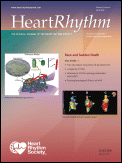
HEART RHYTHM
Scope & Guideline
Shaping the future of cardiovascular medicine.
Introduction
Aims and Scopes
- Electrophysiological Mechanisms and Arrhythmias:
Research focused on the mechanisms underlying various cardiac arrhythmias, including atrial fibrillation, ventricular tachycardia, and inherited arrhythmia syndromes. This includes studies on cellular and molecular pathways that contribute to arrhythmogenesis. - Device Therapy and Innovations:
Exploration of cardiac implantable electronic devices (CIEDs), including pacemakers and implantable cardioverter-defibrillators (ICDs). The journal features studies on the efficacy, safety, and technological advancements in device therapy. - Clinical Outcomes and Management Strategies:
Investigation of clinical outcomes associated with different arrhythmia management strategies, including catheter ablation, pharmacological interventions, and surgical approaches. This includes studies assessing long-term outcomes and quality of life for patients. - Population Health and Epidemiology:
Research addressing the epidemiology of arrhythmias in various populations, including risk factors, incidence rates, and the impact of comorbidities on arrhythmia outcomes. - Translational Research and Novel Therapies:
Studies that bridge basic science and clinical practice, focusing on the development of new therapeutic strategies, including gene therapy, neuromodulation, and the use of artificial intelligence in arrhythmia management.
Trending and Emerging
- Pulsed Field Ablation Techniques:
Pulsed field ablation is gaining traction as a novel technique for treating atrial fibrillation and other arrhythmias, highlighting its efficacy and safety compared to traditional thermal ablation methods. - Artificial Intelligence and Machine Learning:
The integration of AI and machine learning into arrhythmia detection and management is a rapidly growing area, focusing on predictive analytics and enhancing diagnostic accuracy through advanced algorithms. - Personalized and Precision Medicine:
Research is increasingly tailored towards understanding individual patient characteristics and genetic profiles, aiming to personalize treatment strategies for arrhythmias. - Wearable Technology for Monitoring:
The use of wearable devices for continuous cardiac monitoring and arrhythmia detection is trending, with studies exploring their effectiveness and clinical utility in managing patients. - Neuroautonomic Modulation in Arrhythmias:
Emerging research into the role of the autonomic nervous system in arrhythmogenesis is gaining attention, focusing on interventions that modify autonomic tone to prevent arrhythmias.
Declining or Waning
- Traditional Pharmacological Therapies:
Research on older antiarrhythmic drugs has seen a decrease as newer therapies and technologies emerge, shifting focus towards novel agents and personalized medicine approaches. - Invasive Procedures without Technological Support:
There is a waning interest in traditional invasive electrophysiological studies without technological enhancements, as newer, less invasive techniques and comprehensive mapping systems gain popularity. - Generalized Population Studies:
While population health studies remain important, there is a decline in broad epidemiological studies without specific focus, as research trends towards more targeted investigations addressing particular arrhythmias or patient subgroups.
Similar Journals

Heart Views
Pioneering insights in cardiology for global impact.Heart Views is a prestigious and influential journal dedicated to the field of cardiology and cardiovascular medicine, published by Wolters Kluwer Medknow Publications. With an Open Access model implemented since 2010, the journal ensures that its valuable research findings are accessible to a global audience, fostering knowledge dissemination and collaboration among researchers, professionals, and students alike. While the current impact factor is not specified, its commitment to quality and peer-reviewed content has established it as a significant resource within the cardiology community. The journal publishes a diverse array of articles, including original research, reviews, and clinical studies aimed at advancing the understanding and treatment of cardiovascular diseases. Heart Views serves as an essential platform for sharing innovative ideas and practices, thereby contributing to improved patient care and outcomes in the dynamic field of heart health.

Minerva Cardiology and Angiology
Exploring the frontiers of cardiology and vascular science.Minerva Cardiology and Angiology, published by EDIZIONI MINERVA MEDICA, is a prominent journal in the field of cardiology and cardiovascular medicine, with an ISSN of 2724-5683 and E-ISSN of 2724-5772. Established in 2021, this journal aims to foster the dissemination of cutting-edge research, clinical practice guidelines, and innovative methodologies relevant to cardiovascular health. As of 2023, it holds a commendable Q3 quartile rank in its category, reflecting its growing influence within the scientific community. The journal is indexed in Scopus, where it ranks #221 out of 387 in its field, placing it in the 43rd percentile overall. Although it currently does not offer Open Access options, articles published in Minerva Cardiology and Angiology contribute significantly to ongoing discussions and advancements in heart and vascular health. The journal serves as an invaluable resource for researchers, healthcare professionals, and students seeking to stay informed on the latest developments in cardiology.

Frontiers in Cardiovascular Medicine
Fostering Collaboration to Shape the Future of Cardiology.Frontiers in Cardiovascular Medicine is a leading open-access journal published by FRONTIERS MEDIA SA, dedicated to advancing research in the field of cardiology and cardiovascular medicine. Since its inception in 2014, the journal has become a vital platform for the dissemination of high-quality research, boasting a commendable Q2 rank in the 2023 category for Cardiology and Cardiovascular Medicine. With a focus on promoting innovative studies and clinical insights, Frontiers in Cardiovascular Medicine facilitates open access to its content, allowing researchers, healthcare professionals, and students from around the globe to engage with the latest findings which are critical for the advancement of cardiovascular health. The journal's significant presence in the academic landscape, as indicated by its Scopus ranking (161/387 and 58th percentile), underscores its importance as a research outlet in this essential field. Located in Lausanne, Switzerland, the journal continues to support the global cardiovascular community by encouraging collaboration and knowledge sharing to address the challenges faced in cardiovascular medicine today.
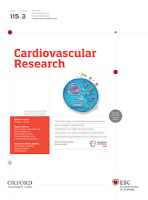
CARDIOVASCULAR RESEARCH
Pioneering discoveries in cardiology and physiology.CARDIOVASCULAR RESEARCH, published by Oxford University Press, is a premier academic journal dedicated to the evolving field of cardiology and cardiovascular medicine. With a remarkable impact factor reflecting its significant contribution to the scientific community, this journal maintains a Q1 ranking in both Cardiology and Physiology categories, demonstrating its commitment to publishing high-quality research that influences clinical practices and healthcare outcomes. Established in 1967, the journal has consistently provided a platform for innovative studies and reviews, aiming to advance our understanding of cardiovascular physiology and pathology. Researchers, professionals, and students will find published articles crucial for their work, as the journal covers a broad spectrum of topics including molecular biology, genetics, and clinical studies. While currently not offering open access options, CARDIOVASCULAR RESEARCH remains accessible through institutional and individual subscriptions, ensuring that the latest findings are available to those in the cardiovascular science community.

AMERICAN JOURNAL OF CARDIOLOGY
Shaping the Future of Cardiology Through Rigorous ResearchThe American Journal of Cardiology is a leading peer-reviewed journal in the field of Cardiology and Cardiovascular Medicine, published by Excerpta Medica Inc-Elsevier Science Inc. Since its inception in 1958, the journal has consistently contributed to the advancement of cardiovascular research, providing a platform for groundbreaking studies and clinical findings that shape modern medical practices. With an impressive impact factor placing it in the Q1 category in its field for 2023, it ranks among the top journals in medicine, with a rank of #155 out of 387 in the Scopus database, reflecting its significance and rigorous editorial standards. The journal is committed to disseminating high-quality research that fosters innovation and enhances clinical outcomes in cardiology. Although it does not provide Open Access options, the American Journal of Cardiology remains an essential resource for researchers, healthcare professionals, and students looking to deepen their understanding of cardiovascular health.
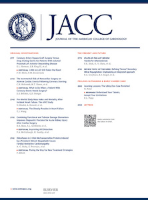
JOURNAL OF THE AMERICAN COLLEGE OF CARDIOLOGY
Exploring the Frontiers of Cardiovascular MedicineJOURNAL OF THE AMERICAN COLLEGE OF CARDIOLOGY, the esteemed publication of Elsevier Science Inc, stands as a premier platform for advancing knowledge in the field of cardiology and cardiovascular medicine. With an impressive impact factor reflecting its prominence—ranked Q1 in its category for 2023 and occupying the 4th position out of 387 in the Scopus listings, firmly placing it in the 99th percentile—this journal is essential for researchers, clinicians, and students alike. Since its inception in 1983, it has continuously provided a vital space for high-quality research and innovative clinical practices, driving forward our understanding of cardiovascular health. While access options are not open, the value of the cutting-edge articles published here cannot be overstated, as they foster collaboration and inform better patient care across the globe. As part of its ongoing commitment to excellence, the journal solicits submissions of original research, reviews, and clinical studies that contribute meaningfully to the field and engage its diverse readership.
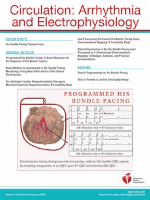
Circulation-Arrhythmia and Electrophysiology
Pioneering insights into arrhythmias and electrical activity.Circulation-Arrhythmia and Electrophysiology, published by Lippincott Williams & Wilkins, is a premier journal dedicated to advancing the field of cardiology and electrophysiology. With a strong emphasis on clinical and experimental research, this journal serves as a critical platform for disseminating innovative findings concerning arrhythmias and cardiac electrical activity. Operating in a highly competitive academic environment, it boasts an impressive Q1 ranking in key categories such as Cardiology and Cardiovascular Medicine, as well as Physiology (medical), positioning it within the top tier of publications in these fields. Spanning a comprehensive converged period from 2008 to 2024, Circulation-Arrhythmia and Electrophysiology offers researchers and clinicians access to cutting-edge studies that inform best practices and influence treatment protocols. Although it does not provide open access options, it remains invaluable for professionals seeking to enhance their understanding of complex electrophysiological phenomena and contribute to the evolution of cardiovascular care.

Netherlands Heart Journal
Elevating Standards in Cardiology with Cutting-Edge FindingsNetherlands Heart Journal is a premier academic publication dedicated to advancing knowledge in the field of cardiology and cardiovascular medicine. Published by BOHN STAFLEU VAN LOGHUM BV, this journal has established itself as a critical platform for researchers, professionals, and students seeking to explore groundbreaking findings and innovative practices in cardiovascular health. With an ISSN of 1568-5888 and E-ISSN 1876-6250, the journal boasts a respectable Q2 ranking in the Cardiology and Cardiovascular Medicine category, placing it in the top half of its field according to the 2023 quartiles. The Scopus ranking places it 130th out of 387 in the relevant category, indicating a commendable percentile rank of 66th, which attests to its influence and quality of published research. Spanning from 2005 to 2024, the journal endeavors to include a diverse array of topics, encompassing clinical practice, technological innovations, and public health considerations related to cardiovascular diseases. Researchers and practitioners are encouraged to engage with the journal's robust content, contributing to and benefiting from the collaborative effort to enhance cardiovascular health worldwide.
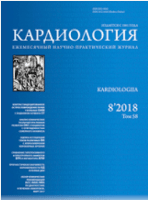
KARDIOLOGIYA
Fostering Collaboration for Heart Health AdvancementsKARDIOLOGIYA is a renowned academic journal in the field of cardiology, published by the Russian Heart Failure Society. Since its inception in 1961, this journal has been dedicated to disseminating cutting-edge research in cardiovascular medicine, contributing to the global understanding of heart-related diseases and their management. With a significant publication history that spans over six decades, KARDIOLOGIYA provides a platform for both established researchers and emerging scholars to publish their findings. Despite its current Q4 category ranking in the 2023 Cardiology and Cardiovascular Medicine category, the journal plays a crucial role in promoting regional insights and advancements in cardiology, while striving towards higher visibility and impact within the academic community. While not an open-access journal, the journal is accessible to institutions and professionals in the Russian Federation and beyond, fostering collaboration and knowledge sharing among healthcare professionals. With a Scopus rank of #259 among 387 journals, it is well-positioned to enhance discourse in the field and support the development of innovative approaches to cardiovascular care.

CURRENT CARDIOLOGY REVIEWS
Bridging Research and Practice in CardiologyCURRENT CARDIOLOGY REVIEWS, an esteemed journal published by BENTHAM SCIENCE PUBL LTD, is a pivotal resource in the field of cardiology and cardiovascular medicine. With an ISSN of 1573-403X and E-ISSN of 1875-6557, this journal presents comprehensive reviews that contribute significantly to the advancement of scientific knowledge and clinical practices in cardiology. Operating with open access options, CURRENT CARDIOLOGY REVIEWS is dedicated to bridging the gap between research and practice, thereby encouraging interdisciplinary collaboration and knowledge sharing. The journal has been instrumental in disseminating high-impact findings, consistently maintaining a Q2 category ranking in both Cardiology and Cardiovascular Medicine, as well as within the miscellaneous categories of Medicine, highlighting its relevance and respect in the academic community. Researchers, practitioners, and students alike will find valuable insights into contemporary cardiovascular issues, practices, and innovations that promote better patient outcomes. Based in the United Arab Emirates, CURRENT CARDIOLOGY REVIEWS encourages global contributions and reflects the latest advancements up to the year 2024, solidifying its role as an essential publication for those engaged in the quest for excellence in cardiovascular health.